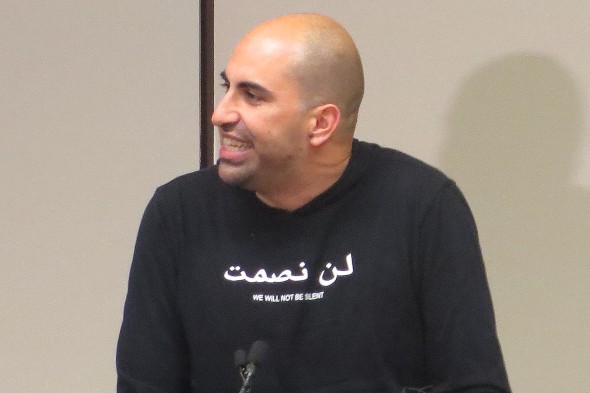Controversy not about the tweets, Salaita says

“We are being told that our job now as thinkers, as teachers, is not to challenge orthodoxy,” says Steven Salaita at a campus lecture Oct. 12. Photo: Monique Phillips
“It’s about tweets? Really, don’t be ridiculous,” Steven Salaita, the academic whose University of Illinois unhiring last year resulted in controversy and legal action, told a UIC crowd Monday night.
In August 2014, the university withdrew its offer to Salaita for a faculty position in American Indian studies at Urbana-Champaign. University administrators said the action was prompted by complaints of anti-Semitism related to Salaita’s tweets about the Israel-Palestine conflict and Israel’s bombing of Gaza.
Salaita filed a lawsuit and the American Association of University Professors has criticized the university for violating principles of academic freedom.
Salaita spoke at UIC with panelists Nadine Naber, associate professor of gender and women studies and Asian American studies, and Roderick Ferguson, professor of gender and women’s studies and African American studies.
Salaita, now the Edward Said chair of American studies at the American University of Beirut, is the author of a new book, Uncivil Rites: Palestine and the Limits of Academic Freedom.
“The book was a way of keeping sane, focused, centered,” he said. “It is absolutely remarkable to me that so many people got together to discuss behind closed doors what to do about an associate professor who was tweeting criticism of the war crimes of a foreign government.
“Why did they care so much?” he said.
Salaita said Zionism “is part and parcel of very structure and maintenance of the corporate academy” and anti-Zionism is “positioned around anti-police brutality activism, economic justice activism, indigenous peoples activism.”
“It always bothered me that I was being characterized as angry or as irrational,” he said. “I decided that in the end, I was going to own it and be proud of it.
“Yes, I was offensive, but I’m also deeply offended by those who are celebrating and justifying war crimes, police brutality, all kinds of state violence.”
Salaita said the position that his tweets were a threat to student wellbeing and safety means “any sort of disagreement constitutes automatically an act of bad pedagogy.”
“We are being told that our job now as thinkers, as teachers, is not to challenge orthodoxy,” he said.
“They want us on social media. They just don’t want us saying the wrong things on social media.”
